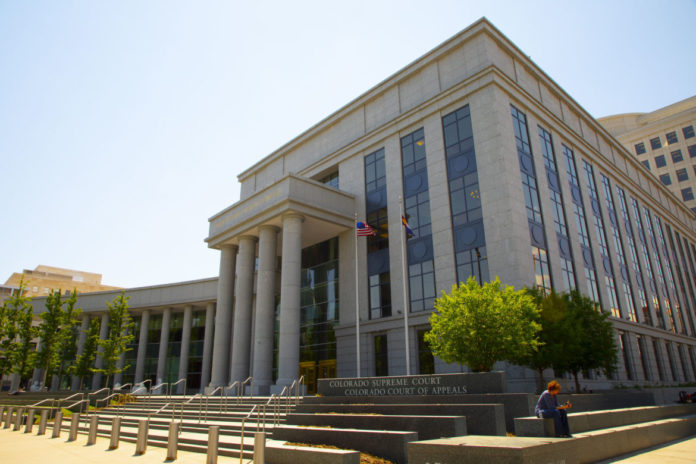
In mid-March Chief Justice Nathan Coats suspended jury calls, with the exception of criminal trials coming up on statutory speedy trial deadlines. But the chief justice waded into new waters with an expansion of the order on April 16. The new directive suspends all jury trials until June 1 and eliminates the exception for imminent deadlines.
“The court itself has a lot of internal authority to issue rules that govern all kinds of things and don’t need a statute,” said Richard Collins, a constitutional law professor at the University of Colorado Law School. “It’s just part of the judicial branch’s independence.”
Section 2 of Article VI in Colorado’s Constitution gives the Supreme Court “general superintending control over all inferior courts, under such regulations and limitations as may be prescribed by law.” And few legal pillars specifically govern criminal trials in Colorado: The speedy trial statute sets a deadline for a defendant to go to trial within six months of pleading not guilty, and the Rules of Criminal Procedure regulate trial protocols. The speedy trial statute codifies a right in the Colorado Constitution that mirrors criminal defendants’ speedy trial rights in the U.S. Constitution.
The Colorado Supreme Court has previously affirmed that the exceptions to the speedy trial law are rigid, and individual judges don’t have discretion to make new ones. Collins said because the chief justice’s order suspended all trials without seeking the consent of any criminal defendants, and any defendants object, that leaves open a question of whether the federal court system might eventually intervene if challenges to the order fail at the state level.
“That’s just anybody’s guess. So many questions arising from this epidemic are novel; there just aren’t existing answers,” Collins said.
On April 7, the Colorado Supreme Court approved a change to Colorado’s Rule of Criminal Procedure 24. It grants authority to courts to declare a mistrial, on their own or by a motion of a party, if a jury pool can’t be safely assembled because of a public health crisis.
The change to Rule 24 is one of several amendments to criminal procedure rules the Supreme Court has quietly adopted over the past month or so to address proceedings during a public health crisis. But none of them directly get at speedy trial rights. James Bullock, 16th Judicial District Attorney, said district attorneys have been talking with legislators about the possibility of a law change to address speedy trials during a public health crisis.
“Until then, we’re kind of concerned from a practitioner’s standpoint that these rules … [have] enough ambiguity that we’re going to have to be arguing the impact on speedy trial,” he said.
Colorado’s Rule of Criminal Procedure 48 mirrors the speedy trial statute. Bullock said the Supreme Court may have decided the change to Rule 24 could be a stopgap for courts to use in the short term until the legislature can address the health crisis issue, to avoid making a rule inconsistent with what the legislature does.
Michael Dougherty, the DA in the 20th Judicial District, said he could see ambiguity for courts determining whether a jury pool couldn’t be safely assembled, making no potential jurors available. He agreed with the call for the legislature to clarify how to handle speedy trial during a health crisis.
“I think that’s particularly important because although the rule change you pointed out is helpful, it still requires very fact-specific analysis, and leaves open the possibility of appeals and an inconsistent approach statewide,” he said. “And I think on an issue this important, we need some statewide consistency, and the ability for defense attorneys and prosecutors to have a clear understanding of what to expect.”
Collins said the timing of Coats expanding his order is interesting because it comes just a few weeks after he joined a dissent in the Supreme Court’s decision that the legislature’s 120 days do not have to be consecutive during a declared disaster emergency. The dissent, written by Justice Carlos Samour and also joined by Justice Brian Boatright, argued even emergency circumstances can’t allow the legislature to change the Constitution either through a statute or a joint rule.
“One of those three justices, of course, was the chief justice, who’s issued this order suspending jury trials,” Collins said. “[He] thinks that the legislature has no right to suspend things, but the judiciary does.”
Dan Recht, a founding shareholder of Recht Kornfeld, said even though the rule change doesn’t specifically mention speedy trial deadlines, it reaches the issue because of established law that extends the required time frame in the instance of a mistrial.
“That is how the Supreme Court has gone about dealing with this unprecedented crisis, and that’s important, because that limits in a sense the constitutional challenges on the basis of speedy trial.”
Bullock said the rule amendment isn’t an equivalent substitute for a defendant waiving their speedy trial rights, though, because a mistrial limits a deadline extension to three months. Under Colorado’s speedy trial law, if a defendant waives their speedy trial rights and agrees to a continuance, the trial deadline is extended by the number of days between when the continuance is granted and the date to which trial is continued.
Recht pointed out the change to Rule 24 could be difficult to challenge because it would mean asking the Supreme Court to declare its own rule unconstitutional.
“I think the odds of that are somewhat slight.”
—Julia Cardi

